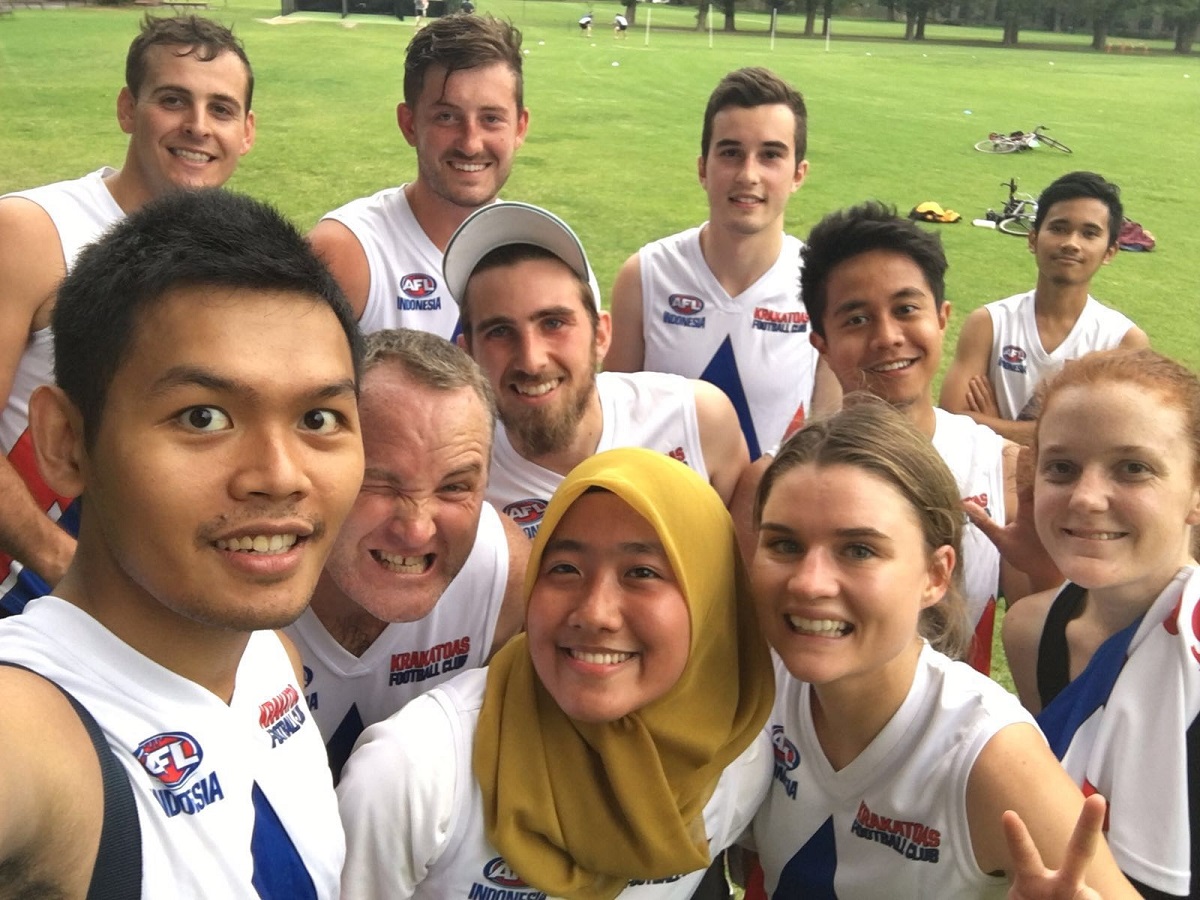Indonesians are bonding more deeply with Melbourne, through football and the Krakatoas
It is a calm Sunday afternoon in late August 2016. For the AFL and amateur footy leagues, the season is coming to an end, but, for the Krakatoas, the pre-season training is just beginning. At the designated meeting time a few have arrived at Arden Street: the home base of the North Melbourne Football Club and temporary training ground for the Krakatoas. There are some young men and women and some parents with young children. It is a social occasion.
Then, the coach, a stocky guy in his early 40s, arrives: he’s cheerful and relaxed and switches casually between informal Indonesian and Aussie slang. This makes sense. He grew up in Western Victoria, but, has only recently returned to Melbourne after living in Jakarta, starting a family and raising two boys who are also beginning to straddle the Indonesia-Australia cultural divide. His name is Iain Shearer, one of the founders of the Krakatoas along with Nasya Bahfen and Ghian Tjandaputra, who together established the team in 2015.
The three founders of the Krakatoas each bring their own strengths and abilities to reach out to both Indonesians living in Melbourne and locals. Nasya, a sporty Indonesian woman; Ghian, who works at the Australia Indonesia Centre and has a strong passion for the Geelong Football Club; and Iain, a relaxed ocker guy, in both languages. Shearer is a graduate from AFL Indonesia where he was part of the Jakarta Bintangs, a football club that allows Aussie expatriates to continue their involvement in footy, while also getting some locals involved in playing the game.
The Krakatoas is a loosely formed, nebulous sporting team. Unlike a proper club, they require minimal commitment and minimal fees. Nor are they subjected to any hard and fast standards of footballing ability. As a sporting club, their identity is still in formation. A mixed team, at any one time there are generally three female players and six male players in the side. The players are united by their interest in three things; playing sport, socialising with others who have a mutual interest in Australia-Indonesia relations, and a willingness or openness to learn about the social, cultural and political conditions of Australia and Indonesia.
Footy and community
Nasya Bahfen moved with her parents to Melbourne from Jakarta when she was a child. She grew up in Box Hill and went to a selective public high school. Nasya has worked as a producer at SBS and the ABC and currently works as a senior lecturer in journalism at Latrobe University. She wears a veil and speaks with an Australian accent. As an academic and journalist, Nasya is frequently invited to give commentary on the media landscape, sports, gender and religious issues. A long-time Australian citizen, she maintains her strong Indonesian family-oriented life, while also being accepted into her partner’s Australian family. Having grown up between Indonesia and Australia, Nasya has been witness to endless controversies, stereotyping and perpetuation of prejudices. Moreover, as a veil-wearing Muslim in post-September 11 era Australia, she has no doubt felt the pressure of being a targeted minority in mainstream society.
Nasya places the Krakatoas in the broader footballing and sporting landscape of Australia. ‘The AFL has no option but to expand the reach of the game. It can no longer be a white-Aussie game. The AFL’s Multicultural Round is a part of this. But it is also a reason for the founding of the Auburn Giants, which also has a women’s team and netball team’. Elsewhere, Nasya has written on the barriers faced by Australian Muslim women wishing to participate in sport – ‘community, cultural and religious attitudes to women and sport, family values and cost [are] some of the barriers that were identified’. The Krakatoas involves a negotiation of ‘traditional’ Islamic values with those of ‘mainstream’ Melbourne sporting culture.
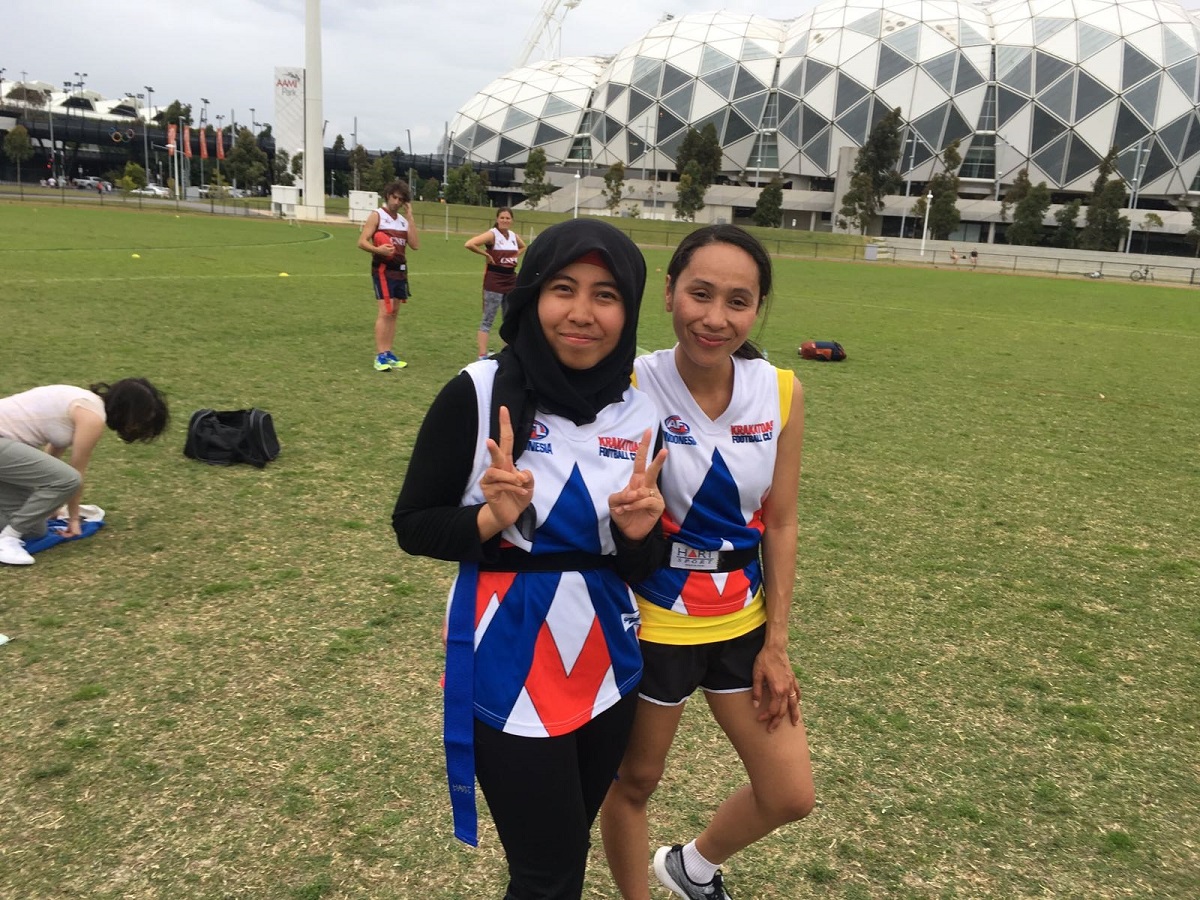
Ana, left, poses with her Krakatoas teammate, Yannie. (Tim Flicker and the Krakatoas)
Ana from Boyolali has played with the Krakatoas for two seasons. She was introduced to the ‘club’ through her friend, Sofi. Ana is doing a masters in TESL at Monash University – where several of her team members are studying. She has one more semester left of her studies before she will return to Salatiga, where she is based at the Institute Agama Islam Negeri. Ana came to the Krakatoas with no previous ball sports experience.
‘I wanted to have sport as a part of my life here in Melbourne. And then, I saw the messages on Sofi’s Whatsapp, and I was added to the list. Then, I quickly started going to training sessions, which were initially held at Fawkner Park. I was really curious to find out about this sport called footy. I had never seen an oval shaped ball and couldn’t really understand the rules. I started googling information about the sport and this helped me ask the right questions at training. The coach, Iain, has a kind of fatherly style, which was quite suitable for myself and others who were just learning the game.’
For Ana, playing with the Krakatoas has nothing to do with winning or losing. It is a social experience which provides life lessons: ‘I enjoy the company of the other players. There is a good attitude and team spirit within the team. I just progressed from one training to the next, without any hiccups. There were many lessons along the way, but it was very emotionally satisfying. Of course, kicking the ball and taking a mark or knowing exactly where to stand and where to run to is difficult to learn, but I know I made progress along the way.’
Playing in a mixed team was also something new for Ana, who back in Indonesia lives in one of her university’s pesantren, or boarding schools. ‘In the beginning, there was a bit of an internal conflict. Back in Salatiga, I had played some sport on Sundays with my [girl]friends, but it was never encouraged too much. We just did some badminton and a little bit of running and stretching. My attitude to playing in a mixed team immediately changed when I played with Krakatoas. I asked, ‘why should I limit myself? Also, during a game, if a female player scores a goal, it is given a higher value, showing that the participation of women is indeed valued.’
One of the stars of the Krakatoas’ second season was Ery Primaskara, an Indonesian language teaching assistant. Ery stood out not only for his size and ability, but mainly for his whole-hearted embrace of footy culture. Ery’s experience of living in Australia has been enhanced by playing footy. This version of footy incorporates hybrid rules, which have made the game accessible to Ery and other beginners and enabled them to engage in authentic and convincing ‘footy talk’ with other fans. As he explains,
‘Playing footy has brought me so much fun. There have been great lessons about sport, making friends and fitting into Melbourne. I’ve been living in Aussie-land for almost a year, and I somehow feel the need to apologise to all my Aussie friends in regards to my careless presumption and silly stereotyping about Australians. I must say that Australia is really welcoming to everyone no matter who you are, where you are from and what your status is. Through footy, I found the other point of view, of seeing different cultures from another nation. This, my friend, is the beauty of sports that you might not find somewhere else.’
Footy, realised through the Krakatoas, mediates the Indonesian players’ experiences with Melbourne, while for the Australian players, spending time together and making friends with Indonesians, offers an opportunity to learn more about Indonesia while still being in Australia.
Andy Fuller is the editor of Reading Sideways and an honorary fellow at The University of Melbourne.
Related articles from the archive
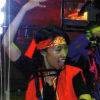 |
Review: Dancing the Feminine |
|
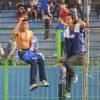 |
Football, violence and politics |
|
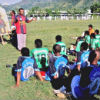 |
Brothers in arms |
